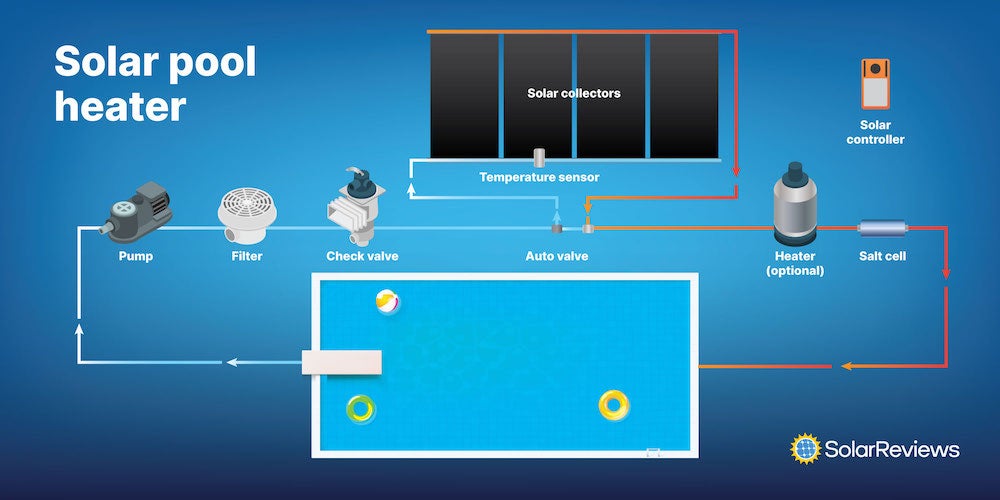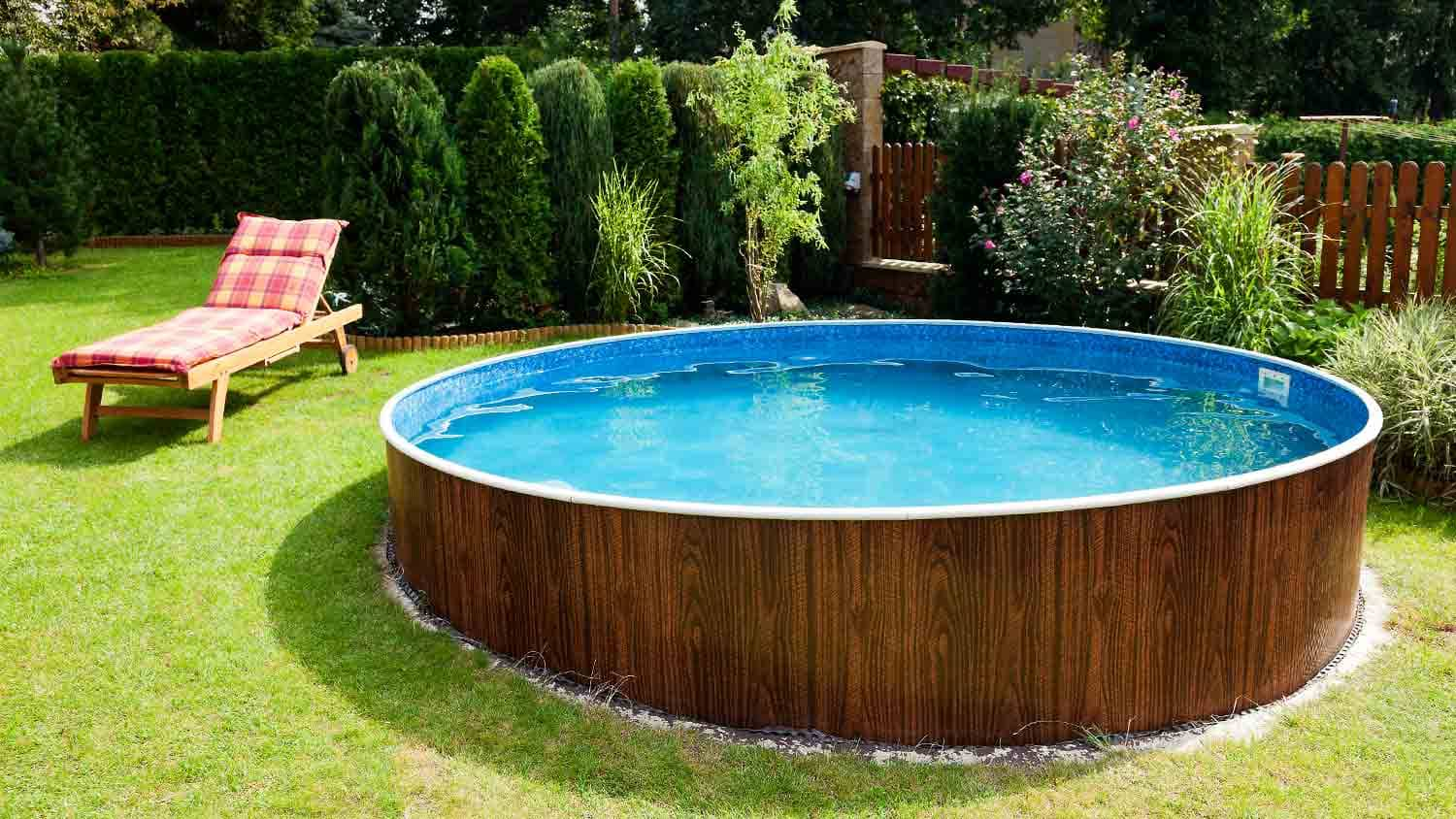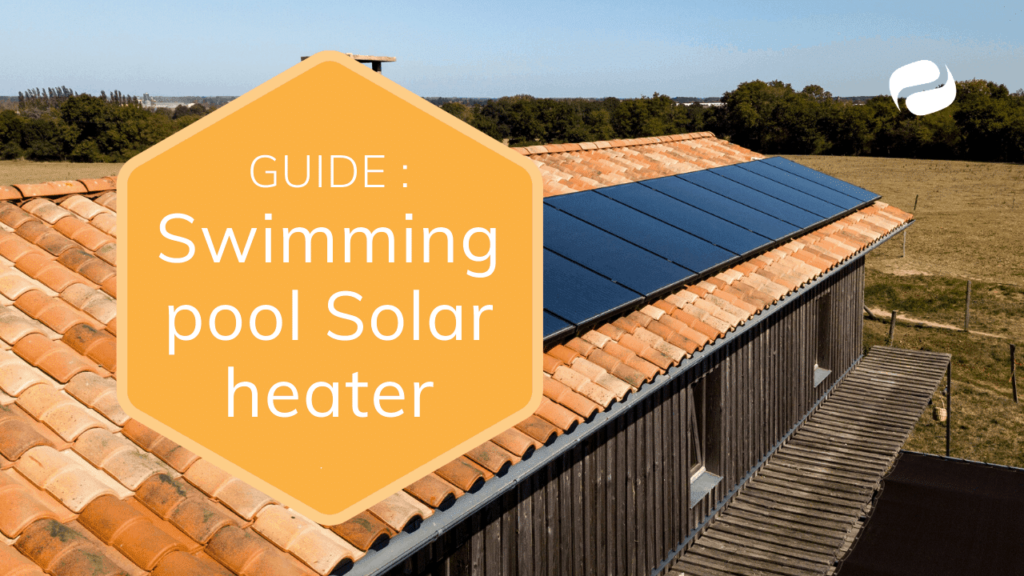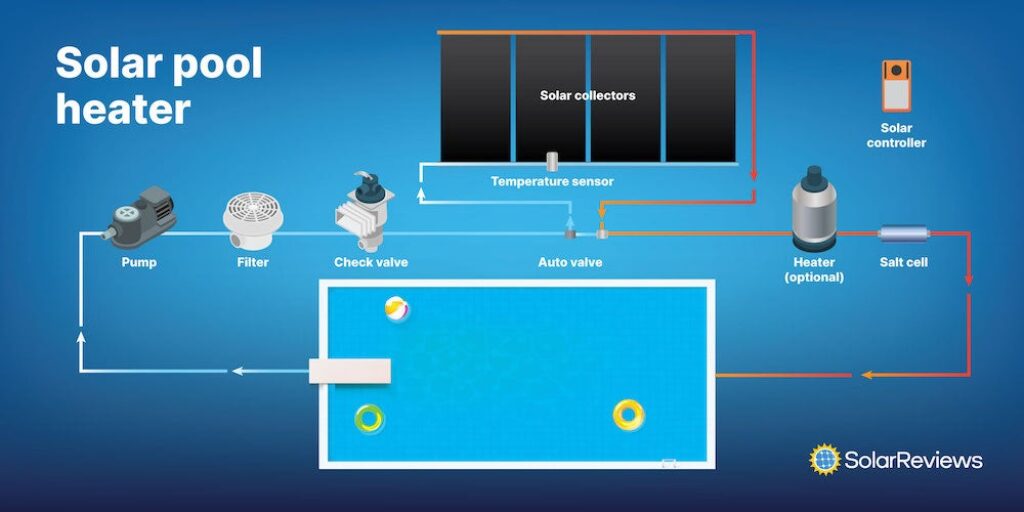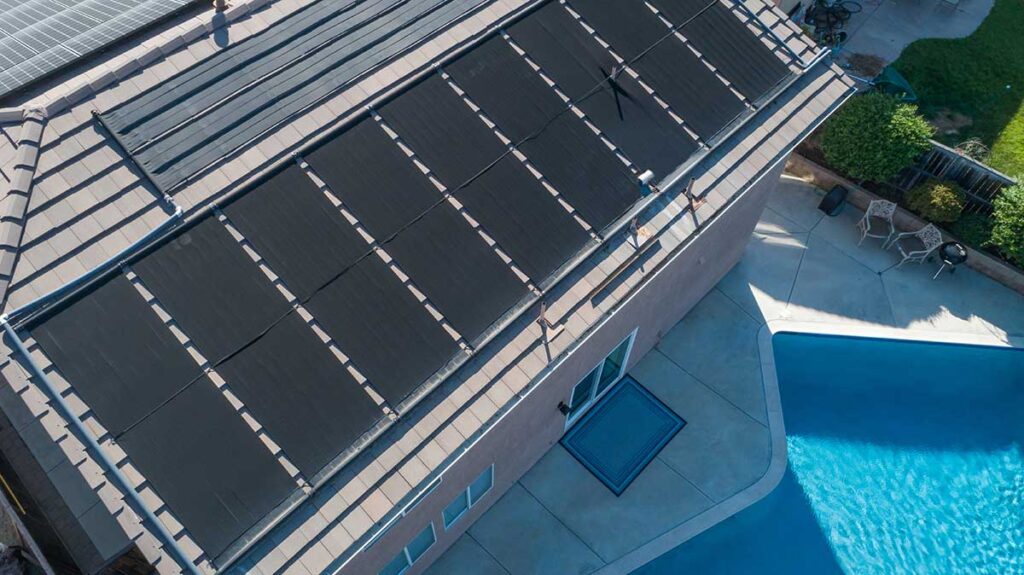Imagine lounging by your pool, basking in the warmth of the sun’s rays while the crystal-clear water beckons you for a refreshing swim. Now, imagine being able to enjoy your pool year-round, even during colder seasons, without worrying about high energy bills. With solar pool heaters, this dream becomes a reality. In this comprehensive guide, we will explore the world of solar pool heaters and how they harness the power of renewable energy to provide you with the comfort and enjoyment you deserve. Say goodbye to shivering dips and skyrocketing utility costs, and say hello to a more sustainable and relaxing pool experience.
1. How Solar Pool Heaters Work
Solar pool heaters are an excellent way to harness the power of the sun to heat your pool water and extend your swimming season. Understanding how these systems work can help you make an informed decision about whether they are the right option for you.
1.1 Basic principles of solar pool heaters
Solar pool heaters work by capturing the heat energy from the sun and transferring it to the pool water. The systems consist of solar collectors, which are usually mounted on the roof or ground near the pool, and a circulation system that pumps the pool water through the collectors. As the water passes through the collectors, it absorbs heat from the sun and returns to the pool at a higher temperature.
1.2 Components of a solar pool heating system
A solar pool heating system typically consists of the following components:
- Solar Collectors: These are the key component of the system and are responsible for capturing the sun’s heat energy. They are usually made of durable, weather-resistant materials such as plastic or copper.
- Pump: The pump circulates the pool water through the solar collectors, ensuring efficient heat transfer.
- Filter: The filter removes any debris or impurities from the pool water before it enters the solar collectors.
- Flow Control Valve: This valve regulates the flow of water through the solar collectors, optimizing the heating process.
- Plumbing: The plumbing connects all the components of the system, allowing for the movement of water between the pool, solar collectors, pump, and filter.
- Controller: Some systems come with a controller that automatically regulates the operation of the solar heating system based on pool temperature and ambient conditions.
2. Advantages of Solar Pool Heaters
Solar pool heaters offer numerous advantages that make them an attractive choice for pool owners. Here are some of the key benefits:
2.1 Reduced energy costs
One of the most significant advantages of solar pool heaters is their ability to reduce energy costs. By harnessing the free energy of the sun, these systems can significantly decrease the energy required to heat your pool. This leads to substantial savings on your monthly utility bills, especially during the peak swimming season.
2.2 Environmental benefits
Solar pool heaters are an environmentally friendly alternative to traditional heating systems. They do not produce any greenhouse gas emissions or rely on finite fossil fuels. By choosing a solar heating system, you are actively contributing to the reduction of carbon emissions and helping combat climate change.
2.3 Extended swimming season
Perhaps the most noticeable advantage of solar pool heaters is the extended swimming season they offer. By utilizing the power of the sun, these systems can heat your pool water to a comfortable temperature, even during cooler months. This means you can enjoy your pool for a more significant part of the year, maximizing your investment and enhancing your overall pool experience.
This image is property of dualsun.com.
3. Types of Solar Pool Heaters
There are several types of solar pool heaters available in the market, each offering its own unique advantages. Understanding the different options can help you choose the best system for your needs.
3.1 Solar panel heaters
Solar panel heaters are the most common type of solar pool heating systems. They feature a series of panels that collect solar energy and transfer it to the pool water. These panels are typically made of durable materials like plastic or copper, and they are mounted on rooftops or racks near the pool.
3.2 Solar ring heaters
Solar ring heaters consist of inflatable rings that float on the surface of the pool. These rings capture sunlight and transfer the heat to the pool water. The advantage of solar rings is their portability and ease of installation. However, they may not be as effective as other types of solar pool heaters, especially for larger pools.
3.3 Solar mat heaters
Solar mat heaters, also known as solar blankets or covers, are large, flexible mats made of rubber or plastic. These mats are spread over the surface of the pool and absorb heat from the sun. They work by preventing heat loss through evaporation and radiation, effectively heating the pool water. Solar mat heaters are relatively inexpensive and easy to install, making them a popular choice among pool owners.
4. Sizing a Solar Pool Heating System
Properly sizing your solar pool heating system is crucial for optimal performance and energy efficiency. Consider the following factors when determining the size of your system:
4.1 Calculating the required collector area
The collector area is a key factor in determining the size of your solar pool heating system. It depends on factors such as the size of your pool, the desired temperature increase, and the local climate conditions. A general rule of thumb is that the collector area should be equal to at least 50-100% of the pool surface area, depending on your location and specific requirements.
4.2 Considering pool size and temperature requirements
The size of your pool and the desired temperature increase also play a crucial role in sizing your solar pool heating system. Larger pools will require larger collector areas to effectively heat the water. Additionally, if you live in a colder climate or want to maintain a higher pool temperature, you may need a larger system to accommodate these requirements.
This image is property of www.solarreviews.com.
5. Installation Process
Installing a solar pool heating system requires careful planning and consideration. Here are the key steps involved in the installation process:
5.1 Determining the best location for solar collectors
The first step in the installation process is determining the optimal location for the solar collectors. Ideally, they should be placed in a spot that receives maximum sunlight throughout the day. This is typically on a south-facing roof or an area with unobstructed sunlight exposure.
5.2 Connecting the solar collectors to the pool system
Once the location of the solar collectors is determined, they need to be properly connected to the pool system. This involves plumbing the solar collectors to the pool pump and filter, as well as installing any necessary valves and controls. It is crucial to ensure proper installation and sealing to prevent leaks and ensure efficient operation.
6. Maintenance and Care
Regular maintenance and care are essential for ensuring the optimal performance and longevity of your solar pool heating system. Here are some key maintenance tasks to keep in mind:
6.1 Regularly cleaning the solar collectors
Over time, dust, dirt, and debris can accumulate on the surface of the solar collectors, reducing their efficiency. It is important to regularly clean the collectors to remove any obstructions. This can be done using a hose or a soft brush, being careful not to damage the collectors.
6.2 Checking for leaks or damage
Regularly inspecting the solar collectors, plumbing, and other components for leaks or damage is crucial. Any signs of leaks or damage should be addressed immediately to ensure proper operation. It is also advisable to have a professional inspection of your system at least once a year to identify any potential issues early on.
6.3 Winterizing the system
In colder climates, it is important to winterize your solar pool heating system to protect it from freezing temperatures. This involves draining the system, disconnecting and storing any exposed components, and taking other necessary precautions to prevent damage.
This image is property of www.thetechedvocate.org.
7. Common Issues and Troubleshooting
While solar pool heaters are generally reliable, there are some common issues that may arise. Here are a few troubleshooting tips for addressing these problems:
7.1 Insufficient heating
If your solar pool heater is not providing sufficient heating, there could be several possible reasons. Start by checking the collector area and ensuring it is properly sized for your pool. You should also inspect the collectors for any obstructions or damage. Additionally, verify that the flow control valve and pump are working correctly.
7.2 Pool water leakage
Leakage in the pool water circulation system can lead to reduced efficiency and potential damage. Inspect the plumbing connections, valves, and pump for any signs of leaks. Tighten loose fittings and replace any damaged components as necessary.
7.3 Malfunctioning components
If certain components of your solar pool heating system are not functioning correctly, it may be necessary to troubleshoot and potentially replace them. This could include the pump, flow control valve, or other electrical or mechanical components. Consult the manufacturer’s manual or seek professional assistance if needed.
8. Cost and Return on Investment
Considering the cost and return on investment is an important aspect of choosing a solar pool heating system. Here are some key factors to consider:
8.1 Initial installation costs
The initial installation costs of a solar pool heating system can vary depending on the size of your pool, the type of system chosen, and other factors. It is important to obtain multiple quotes from reputable installers to ensure you are getting a fair price.
8.2 Potential energy savings
Solar pool heaters can result in significant energy savings compared to traditional heating methods. By reducing your reliance on gas, electricity, or heat pumps, you can expect lower monthly utility bills.
8.3 Estimating the payback period
The payback period for a solar pool heating system depends on various factors, including the initial installation cost and the energy savings achieved. Generally, the payback period ranges from 2 to 7 years, making solar pool heaters a worthwhile long-term investment.
This image is property of www.solarreviews.com.
9. Comparing Solar Pool Heaters with Other Options
When considering different heating options for your pool, it is essential to compare solar pool heaters with other alternatives. Here are some comparisons to help you make an informed decision:
9.1 Solar pool heaters vs. gas heaters
Solar pool heaters offer significant advantages over gas heaters. They operate using renewable energy, resulting in lower operating costs and reduced greenhouse gas emissions. Gas heaters, on the other hand, rely on fossil fuels and can be more expensive to operate.
9.2 Solar pool heaters vs. electric heaters
Compared to electric heaters, solar pool heaters are more energy-efficient and cost-effective. Solar energy is free, making the operation of solar pool heaters significantly cheaper compared to electric heaters that rely on electricity from the grid.
9.3 Solar pool heaters vs. heat pumps
Heat pumps use electricity to transfer heat from the air or ground to the pool water. While they are energy-efficient, they can be more expensive to operate than solar pool heaters. Solar pool heaters offer the advantage of harnessing the sun’s energy directly, resulting in lower operating costs over time.
10. Conclusion
Solar pool heaters are an excellent option for pool owners looking to reduce energy costs, extend their swimming season, and contribute to a more sustainable future. By understanding how these systems work, the different types available, and the key considerations for installation and maintenance, you can make an informed decision and enjoy the benefits of harnessing renewable energy for comfort. With proper sizing, installation, and maintenance, a solar pool heating system can provide you with a comfortable and eco-friendly swimming experience for years to come.
